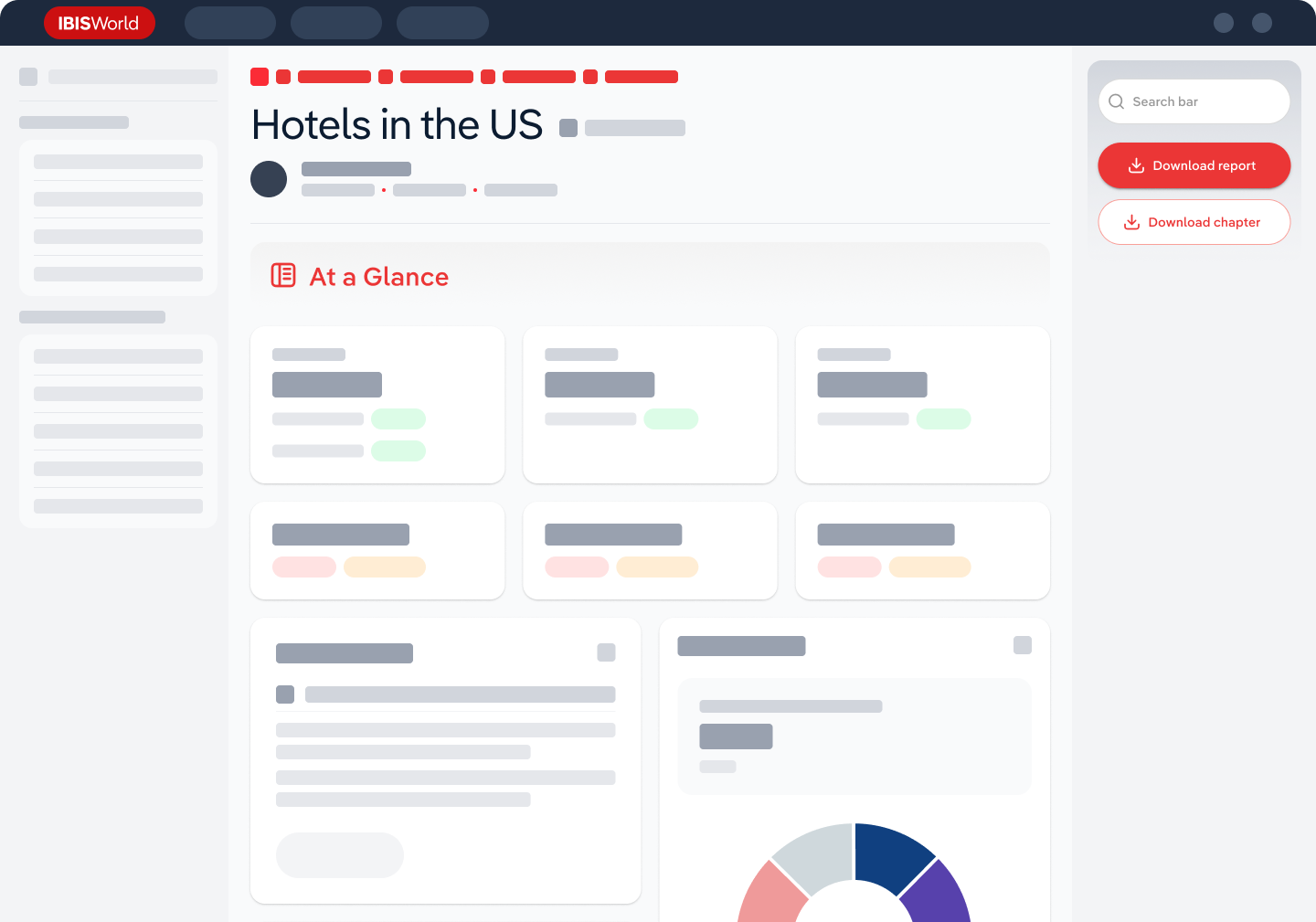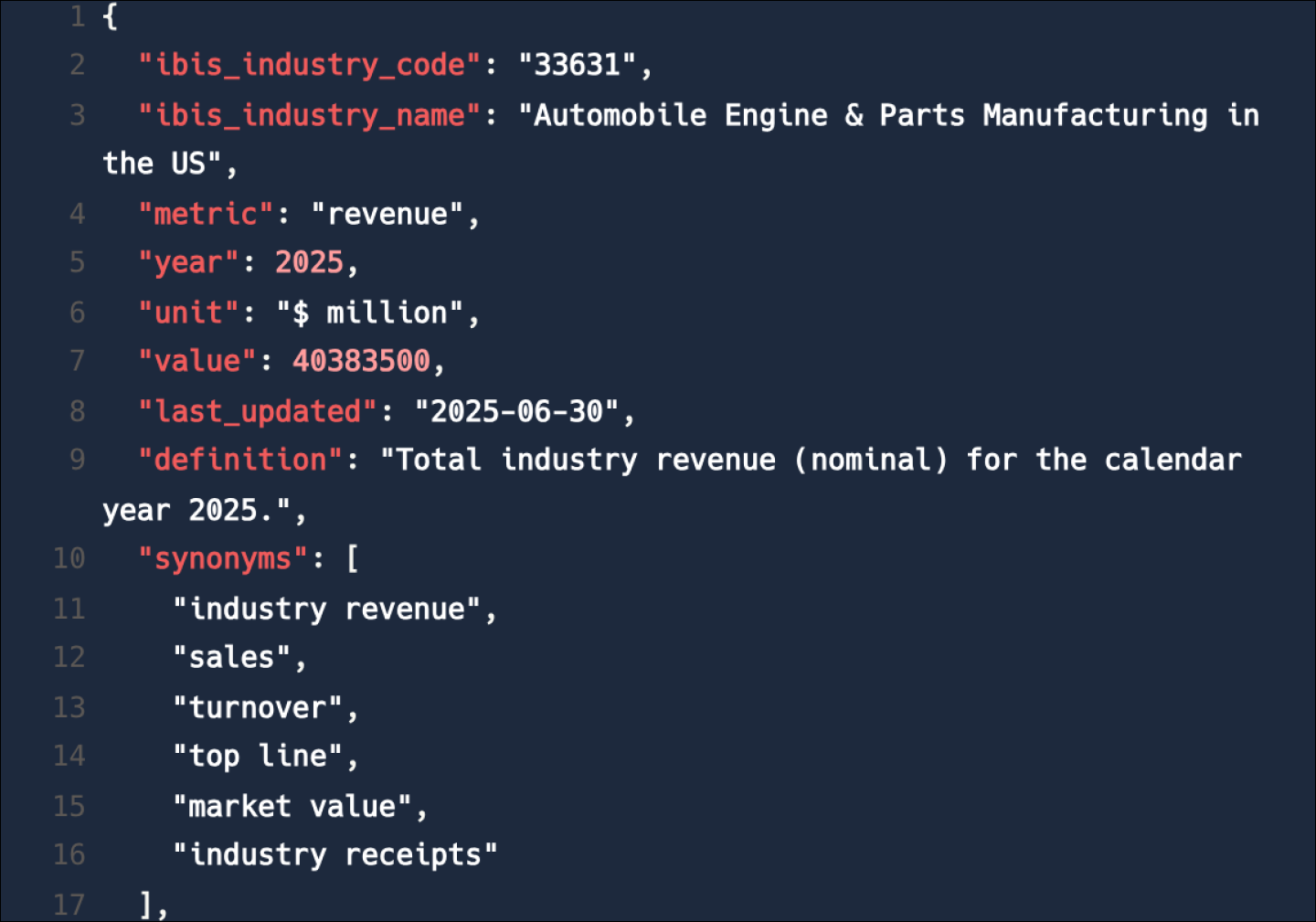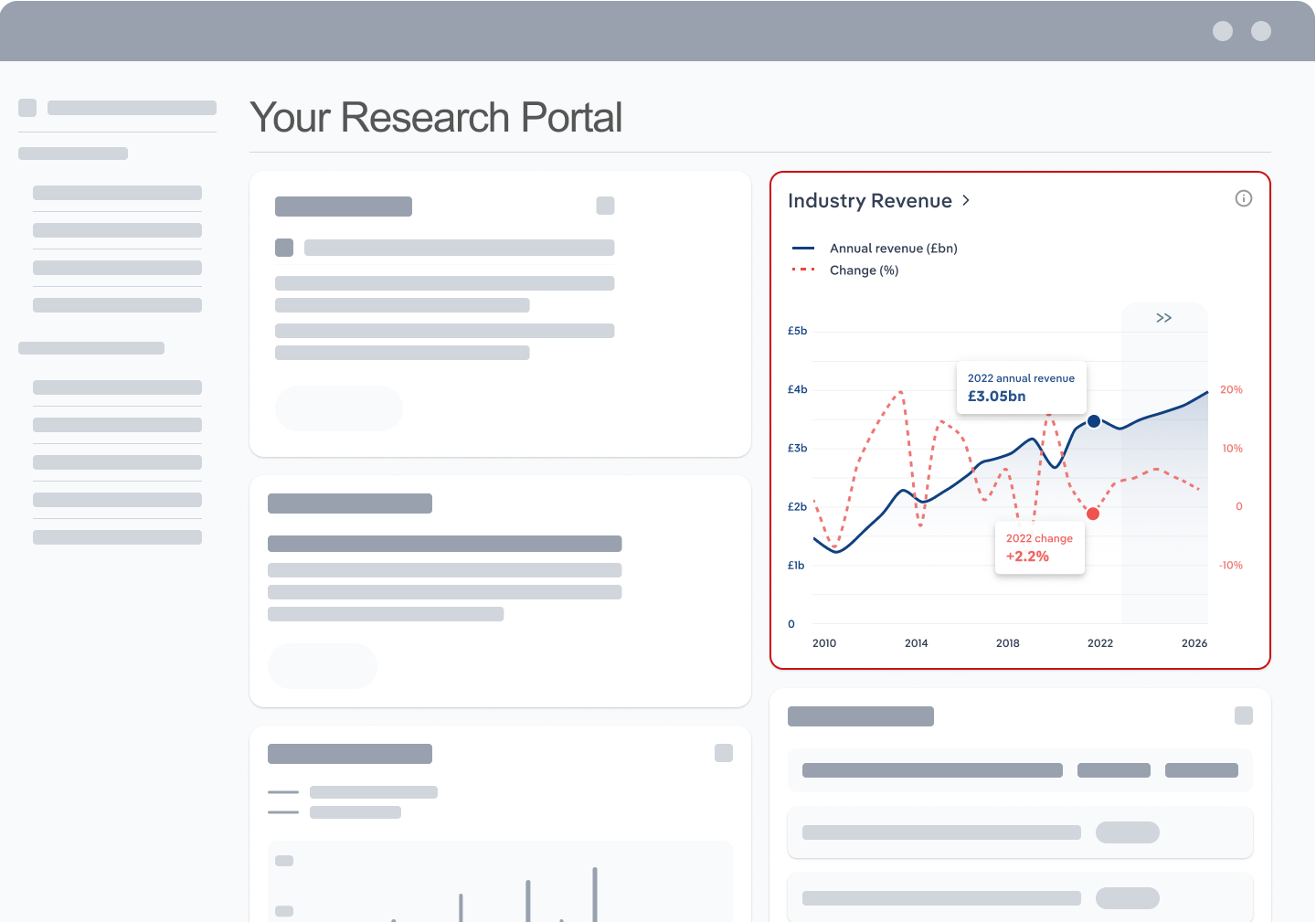Industry Statistics and Trends
Market size and recent performance (2015-2030)
Industry revenue has grown at a CAGR of 1.5 % over the past five years, to reach an estimated £108.3m in 2025.
Trends and Insights
Demand for fuel cards mirrors fuel price fluctuations
- Supply chain disruptions caused by Russia’s invasion of Ukraine in 2022 spiked fuel prices. According to the ONS, petrol reached 191.23 pence (p) per litre in June 2022 and diesel reached 198.9p per litre. Demand climbed and spiked revenue for fuel card providers as companies sought tools to navigate volatile costs, boosting revenue across the industry.
- Additional trends and insights available with purchase
Industry outlook (2025-2030)
Market size is projected to grow over the next five years.
Trends and Insights
Future fuel prices look volatile amid ongoing conflict and fuel duty uncertainty
- Fuel prices should stabilise in the coming years if geopolitical shocks ease as global conflicts are resolved. This will lead businesses to become less reliant on fuel cards to save costs, particularly those that focus on internal management. Lower fuel prices will diminish the urgency of fleet management tools, reducing card usage and sales.
Biggest companies in the Fuel Cards in the UK
| Company | Market Share (%)
2026 | Revenue (£m)
2026 |
|---|---|---|
Allstar Business Solutions Ltd | 6.3 | |
UK Fuels Ltd | 3.9 | |
The Fuelcard Company UK Ltd | 3.0 |
To view the market share and analysis for all 3 top companies in this industry, view purchase options.
Products & Services Segmentation
Industry revenue is measured across several distinct product and services lines, including Company, Bunkered and Retail. Company is the largest segment of the Fuel Cards in the UK.
Trends and Insights
Company fuel card packages provide the bulk of demand
- Fleet management companies and fleet-orientated businesses that rely on domestic transportation for daily operations (including couriers) often choose company fuel cards for pence-per-litre discounts on fuel at a specified vertically integrated or third-party partnership forecourt network.
- More insights available in the full report
Table of Contents
About this industry
Industry definition
Companies in this industry supply business customers with fuel cards. Commercial drivers use a fuel card as a payment card at a specified network of forecourts. Instead of paying with cash, credit, or debit cards, the driver presents the fuel card to the cashier. Fuel cars bill the company directly and the employee can collect a receipt as proof of purchase. This industry excludes the sale of fuel and the provision of ancillary services, including telematics and fleet management.
What's included in this industry?
Products and services covered in the Fuel Cards industry in the United Kingdom include Company fuel cards , Bunkered fuel cards , Retail fuel cards and International fuel cards .Companies
Companies covered in the Fuel Cards industry in the United Kingdom include Allstar Business Solutions Ltd, UK Fuels Ltd and The Fuelcard Company UK Ltd.Purchase this report to view all 3 major companies in this industry.
Related Terms
Related terms covered in the Fuel Cards industry in the United Kingdom include fleet management, telematics, value-added tax (vat), eurovignette and net-zero.Industry Code
SIC 47.3 - Fuel Cards in the UK
Performance
Get an indication of the industry's health through historical, current and forward-looking trends in the performance indicators that make or break businesses.
Analyst insights
Market conditions influenced fuel card demand. Moderating fuel prices have lowered demand for fuel cards; however, rising business uncertainty offset this and propped up reve...
In this chapter (4)
- Current Performance
- Outlook
- Volatility
- Life Cycle
Key metrics
- Annual Revenue, Recent Growth, Forecast, Revenue Volatility
- Number of Employees, Recent Growth, Forecast, Employees per Business, Revenue per Employee
- Number of Businesses, Recent Growth, Forecast, Employees per Business, Revenue per Business
- Total Profit, Profit Margin, Profit per Business
Charts
- Revenue, including historical (2015-2024) and forecast (2025-2030)
- Employees, including historical (2015-2024) and forecast (2025-2030)
- Businesses, including historical (2015-2024) and forecast (2025-2030)
- Profit, including historical (2015-2025)
- Industry Volatility vs. Revenue Growth
- Industry Life Cycle
Detailed analysis
- Trends in supply, demand and current events that are driving current industry performance
- Expected trends, economic factors and ongoing events that drive the industry's outlook
- Key success factors for businesses to overcome volatility
- How contribution to GDP, industry saturation, innovation, consolidation, and technology and systems influence the industry's life cycle phase.
Products and Markets
Learn about an industry's products and services, markets and trends in international trade.
Analyst insight
Demand for company fuel card packages is high. Fleet-oriented businesses that rely on domestic transportation for daily operations often choose company fuel cards for pence-p...
In this chapter
- Products & Services
- Major Markets
Key metrics
- Largest market segment and value in 2025
- Product innovation level
Charts
- Products & services segmentation in 2025
- Major market segmentation in 2025
Detailed analysis
- Trends impacting the recent performance of the industry's various segments
- Innovations in the industry's product or service offering, specialization or delivery method
- Key factors that successful businesses consider in their offerings
- Buying segments and key trends influencing demand for industry products and services
Geographic Breakdown
Discover where business activity is most concentrated in an industry and the factors driving these trends to find opportunities and conduct regional benchmarking.
Analyst insights
The South East is home to a number of consumer markets. Fuel card providers base themselves in the region due to high demand, as a considerable number of HGV fleets are locat...
In this chapter (1)
- Business Locations
Charts
- Share of revenue, establishment, wages and employment in each region
- Share of population compared to establishments in each region in 2025
Tables
- Number and share of establishments in each region in 2025
- Number and share of revenue each region accounts for in 2025
- Number and share of wages each region accounts for in 2025
- Number and share of employees in each region in 2025
Detailed analysis
- Geographic spread of the industry across Europe, and trends associated with changes in the business landscape
- Key success factors for businesses to use location to their advantage
Competitive Forces
Get data and insights on what's driving competition in an industry and the challenges industry operators and new entrants may face, with analysis built around Porter's Five Forces framework.
Analyst insights
The fuel cards industry has a high level of competition. Competition is primarily based on the degree of fuel cost savings a given fuel card provider can offer business custo...
In this chapter (4)
- Concentration
- Barriers to Entry
- Substitutes
- Buyer & Supplier Analysis
Key metrics
- Industry concentration level
- Industry competition level and trend
- Barriers to entry level and trend
- Substitutes level and trend
- Buyer power level and trend
- Supplier power level and trend
Charts
- Market share concentration among the top 4 suppliers from 2020-2025
- Supply chain including upstream supplying industries and downstream buying industries, flow chart
Detailed analysis
- Factors impacting the industry’s level of concentration, such as business distribution, new entrants, or merger and acquisition activity.
- Key success factors for businesses to manage the competitive environment of the industry.
- Challenges that potential industry entrants face such as legal, start-up costs, differentiation, labor/capital intensity and capital expenses.
- Key success factors for potential entrants to overcome barriers to entry.
- Competitive threats from potential substitutes for the industry’s own products and services.
- Key success factors for how successful businesses can compete with substitutes.
- Advantages that buyers have to keep favorable purchasing conditions.
- Advantages that suppliers have to maintain favorable selling conditions.
- Key success factors for how businesses can navigate buyer and supplier power.
Companies
Learn about the performance of the top companies in the industry.
Analyst insights
Allstar has a range of revenue streams. The company offers business customers five types of fuel cards, including its core fuel card, the Allstar One Fuel Card, which provide...
In this chapter
- Market Share Concentration
- Companies
- Company Spotlights
Charts
- Industry market share by company in 2021 through 2025
- Major companies in the industry, including market share, revenue, profit and profit margin in 2025
- Overview of Allstar Business Solutions Ltd's performance by revenue, market share and profit margin from 2019 through 2025
- Overview of UK Fuels Ltd's performance by revenue, market share and profit margin from 2019 through 2025
- Overview of The Fuelcard Company UK Ltd's performance by revenue, market share and profit margin from 2019 through 2025
Detailed analysis
- Description and key data for Allstar Business Solutions Ltd, and factors influencing its performance in the industry
- Description and key data for UK Fuels Ltd, and factors influencing its performance in the industry
- Description and key data for The Fuelcard Company UK Ltd, and factors influencing its performance in the industry
External Environment
Understand the demographic, economic and regulatory factors that shape how businesses in an industry perform.
Analyst insights
Fuel prices are volatile. Fleet managers are more inclined to seek effective methods to reduce fuel expenditure when pump prices increase, raising demand for fuel cards and s...
In this chapter
- External Drivers
- Regulation & Policy
- Assistance
Key metrics
- Regulation & policy level and trend
- Assistance level and trend
Charts
- Regulation & Policy historical data and forecast (2015-2030)
- Assistance historical data and forecast (2015-2030)
Detailed analysis
- Demographic and macroeconomic factors influencing the industry, including Regulation & Policy and Assistance
- Major types of regulations, regulatory bodies, industry standards or specific regulations impacting requirements for industry operators
- Key governmental and non-governmental groups or policies that may provide some relief for industry operators.
Financial Benchmarks
View average costs for industry operators and compare financial data against an industry's financial benchmarks over time.
Analyst insights
Profit fluctuates in line with fuel prices. When fuel prices fall, demand for fuel cards fall and this lowers industry revenue, weighing on industry profit margin.
In this chapter
- Cost Structure
- Financial Ratios
- Key Ratios
Key metrics
- Profit margin, and how it compares to the sector-wide margin
- Average wages, and how it compares to the sector-wide average wage
- Largest cost component as a percentage of revenue
- Industry average ratios for days' receivables, industry coverage and debt-to-net-worth ratio
Charts
- Average industry operating costs as a share of revenue, including purchases, wages, depreciation, utilities, rent, other costs and profit in 2025
- Average sector operating costs as a share of revenue, including purchases, wages, depreciation, utilities, rent, other costs and profit in 2025
- Investment vs. share of economy
Data tables
- Liquidity Ratios (2019-2023)
- Coverage Ratios (2019-2023)
- Leverage Ratios (2019-2023)
- Operating Ratios (2019-2023)
- Assets (2019-2023)
- Liabilities (2019-2023)
- Cash Flow & Debt Service Ratios (2015-2030)
- Revenue per Employee (2015-2030)
- Revenue per Enterprise (2015-2030)
- Employees per Establishment (2015-2030)
- Employees per Enterprise (2015-2030)
- Average Wage (2015-2030)
- Wages/Revenue (2015-2030)
- Establishments per Enterprise (2015-2030)
- IVA/Revenue (2015-2030)
- Imports/Demand (2015-2030)
- Exports/Revenue (2015-2030)
Detailed analysis
- Trends in the cost component for industry operators and their impact on industry costs and profitability
Key Statistics
Industry Data
Data Tables
Including values and annual change:
- Revenue (2015-2030)
- IVA (2015-2030)
- Establishments (2015-2030)
- Enterprises (2015-2030)
- Employment (2015-2030)
- Exports (2015-2030)
- Imports (2015-2030)
- Wages (2015-2030)
Top Questions Answered
Unlock comprehensive answers and precise data upon purchase. View purchase options.
What is the market size of the Fuel Cards industry in the United Kingdom in 2025?
The market size of the Fuel Cards industry in the United Kingdom is £108.3m in 2025.
How many businesses are there in the Fuel Cards industry in the United Kingdom in 2025?
There are 46 businesses in the Fuel Cards industry in the United Kingdom, which has declined at a CAGR of 0.0 % between 2020 and 2025.
How may import tariffs affect the Fuel Cards industry in the United Kingdom?
The Fuel Cards industry in the United Kingdom is unlikely to be materially impacted by import tariffs with imports accounting for a low share of industry revenue.
How may export tariffs affect the Fuel Cards industry in the United Kingdom?
The Fuel Cards industry in the United Kingdom is unlikely to be materially impacted by export tariffs with exports accounting for a low share of industry revenue.
Has the Fuel Cards industry in the United Kingdom grown or declined over the past 5 years?
The market size of the Fuel Cards industry in the United Kingdom has been growing at a CAGR of 1.5 % between 2020 and 2025.
What is the forecast growth of the Fuel Cards industry in the United Kingdom over the next 5 years?
Over the next five years, the Fuel Cards industry in the United Kingdom is expected to grow.
What are the biggest companies in the Fuel Cards industry in the United Kingdom?
The biggest companies operating in the Fuel Cards industry in the United Kingdom are Allstar Business Solutions Ltd, UK Fuels Ltd and The Fuelcard Company UK Ltd
What does the Fuel Cards industry in the United Kingdom include?
Company fuel cards and Bunkered fuel cards are part of the Fuel Cards industry in the United Kingdom.
Which companies have the highest market share in the Fuel Cards industry in the United Kingdom?
The company holding the most market share in the Fuel Cards industry in the United Kingdom is Allstar Business Solutions Ltd.
How competitive is the Fuel Cards industry in the United Kingdom?
The level of competition is high and steady in the Fuel Cards industry in the United Kingdom.
Methodology
How are IBISWorld reports created?
IBISWorld has been a leading provider of trusted industry research for over 50 years to the most successful companies worldwide. With offices in Australia, the United States, the United Kingdom, Germany and China, we are proud to have local teams of analysts that conduct research, data analysis and forecasting to produce data-driven industry reports.
Our analysts start with official, verified and publicly available sources of data to build the most accurate picture of each industry. Analysts then leverage their expertise and knowledge of the local markets to synthesize trends into digestible content for IBISWorld readers. Finally, each report is reviewed by one of IBISWorld’s editors, who provide quality assurance to ensure accuracy and readability.
IBISWorld relies on human-verified data and human-written analysis to compile each standard industry report. We do not use generative AI tools to write insights, although members can choose to leverage AI-based tools within the platform to generate additional analysis formats.
What data sources do IBISWorld analysts use?
Each industry report incorporates data and research from government databases, industry-specific sources, industry contacts, and our own proprietary database of statistics and analysis to provide balanced, independent and accurate insights.
Key data sources in the UK include:
- Office for National Statistics
- Office for Budget Responsibility
- Bank of England
Analysts also use industry specific sources to complement catch-all sources, although their perspective may focus on a particular organization or representative body, rather than a clear overview of all industry operations. However, when balanced against other perspectives, industry-specific sources provide insights into industry trends.
These sources include:
- Industry and trade associations
- Industry federations or regulators
- Major industry players annual or quarterly filings
Finally, IBISWorld’s global data scientists maintain a proprietary database of macroeconomic and demand drivers, which our analysts use to help inform industry data and trends. They also maintain a database of statistics and analysis on thousands of industries, which has been built over our more than 50-year history and offers comprehensive insights into long-term trends.
How does IBISWorld forecast its data?
IBISWorld’s analysts and data scientists use the sources above to create forecasts for our proprietary datasets and industry statistics. Depending on the dataset, they may use regression analysis, multivariate analysis, time-series analysis or exponential smoothing techniques to project future data for the industry or driver. Additionally, analysts will leverage their local knowledge of industry operating and regulatory conditions to impart their best judgment on the forecast model.
IBISWorld prides itself on being a trusted, independent source of data, with over 50 years of experience building and maintaining rich datasets and forecasting tools. We are proud to be the keystone source of industry information for thousands of companies across the world.
Learn more about our methodology and data sourcing on the Help Center.










